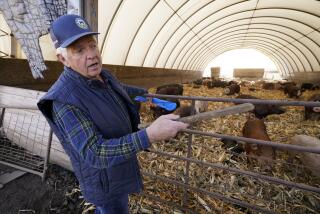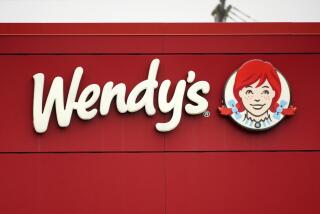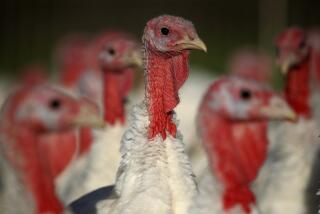Studying chicken, egg issue
- Share via
Seeking to buy eggs produced in a more humane way, McDonald’s Corp. said Thursday that it would undertake a large-scale study involving tens of thousands of hens.
But the Humane Society of the United States said the study probably would delay any significant move by McDonald’s into the U.S. cage-free egg market -- a step some of its rivals have taken.
Most eggs produced in the U.S. come from chickens housed in “battery cages,” which are pens shared by several birds, each of which gets just under 70 square inches of living space.
While the egg industry voluntarily has increased cage space in recent years, some animal welfare groups have continued to criticize the battery system for cramped conditions. In a referendum in November, California voters outlawed battery cages.
McDonald’s is teaming with one of its primary egg suppliers, Cargill Inc., and several animal welfare scientists to conduct a commercial-scale study of housing alternatives for hens, including cage-free and “enriched housing.” The latter involves cages but includes nests and perches for the birds. McDonald’s plans to use eggs produced during the study in its U.S. restaurants and says the project will be producing eggs, including cage-free eggs, by 2011.
Joining McDonald’s and Cargill are researchers from Michigan State University; UC Davis; the American Veterinary Medical Assn.; the U.S. Department of Agriculture; the American Humane Assn.; and the Center for Food Integrity.
The coalition of researchers will take a broad look at sustainable egg production, including examining environmental effects and worker welfare in hen houses.
“There’s a lack of really solid scientific information out there,” including on the most humane way to house birds, said Bob Langert, the fast-food giant’s vice president for corporate social responsibility.
“With the coalition’s research, we will have science-based egg sustainability facts to guide our decisions,” Langert said in a news release.
But Paul Shapiro, head of the Humane Society’s factory-farming initiative, said that because the study will take two years to complete, McDonald’s will be kept from making the “same modest reforms its competitors have already adopted.”
Shapiro noted that Burger King, Hardee’s, Quizno’s, Carl’s Jr. and Denny’s have agreed to make cage-free eggs up to 5% of their U.S. egg purchases.
McDonald’s has made no such commitment. But it said in a federal securities filing that it “supports the use by our suppliers of both cage and cage-free housing for egg-laying hens.”
Added Langert: “I have been to our laying facilities and I am proud of them. The birds are protected well.”
The Humane Society has submitted a resolution to McDonald’s shareholders to adopt a policy mandating phased-in use of cage-free eggs. The measure is slated to be voted on next week at the company’s annual meeting.
More to Read
Inside the business of entertainment
The Wide Shot brings you news, analysis and insights on everything from streaming wars to production — and what it all means for the future.
You may occasionally receive promotional content from the Los Angeles Times.










